
by: Peter Rees in http://www.islandbusiness.com/
World Cup bound Pacific rugby nations Samoa, Fiji and Tonga, are now heading down the home straight in their preparations for France with the two IRB tournaments, the Pacific Rugby Cup and Pacific Six Nations now completed.
But while the game’s elite nations put the final touches on their respective build-ups which started after the last World Cup in 2003, the islands nations have struggled for any continuity over the past four years. The players from the rich top tier nations have begged for a rest from their jam-packed test schedules, forcing the issue for the All Blacks when their coach Graham Henry introduced a reconditioning programme for his top players at the end of last year. But had the shoe been on the other foot, it is unlikely the rugby starved Pacific nations would be complaining.
So without that precious exposure to top level rugby during that four year gap between World Cups, it’s not surprising there is not a great deal of optimism, at least not in Samoa and Tonga. How the Pacific nations are preparing is something to behold.
Fiji is heading into the Cup with a glimmer of hope of making the top eight for the first time since 1987, given that they have avoided the pool of death which contains Samoa and Tonga.
Samoa and Tonga have set their own objectives for France but neither are raising their hopes of a quarterfinal appearance with South Africa and England blocking their path. They have their eyes four years on at the next World Cup in 2011.
“I don’t know if we are going to be able to sneak up as we did on England and South Africa this year,” Manu Samoa coach, Michael Jones, told IRB’s Total Media, referring to the epic match against England in 2003 when the Samoans almost caused an upset over the eventual world champions.
“We will keep a pretty low profile, but I think they will be wary of us given what we were able to do in 2003. So I think it is not going to be as straightforward, there will be a lot more readiness put in place by the teams who face us, in particular the South Africans and the English.”
However, Jones is not ruling out a changing of the guard further down the track.
“We might not see the fruits of our new academy programme, until 2011 so we are really relying still on what we can churn out with what we have.”
Tonga also has the long-term in mind, but their preparations have been affected by divisions within the TRFU board in recent months and the abrupt resignations of their two IRB appointed ex-pat Australians, coach Adam Leach and high performance manager Andrew Stainlay, within the space of a year.
Ellis Meachen, Tonga’s assistant national coach and high performance director, is adamant though that Tonga’s World Cup campaign is still on track. He is more upset that the IRB decided to place Tonga in the same pool with Samoa, England and South Africa when their repechage qualifying spot was supposed to be seeded in Pool C with New Zealand and Scotland.
“I can’t understand why they would have two teams from Oceania in the same pool. We were supposed to be New Zealand’s pool but that was changed,” Meachen told ISLANDS BUSINESS. But the IRB has wisely dangled another carrot for teams to perform to their optimum come September 7 when the World Cup kicks off. The world body announced in May a change to the qualifying process as of 2011. The top 12 teams from this year’s tournament will automatically qualify for 2011, while the rest will have to qualify through a newly proposed World Trophy qualifying tournament, held at a single venue a year before the World Cup.
This means, for Samoa and Tonga, third place (behind England and South Africa) suddenly becomes vital as the top three teams from each of the four pools will qualify for 2011. Motivation aplenty.
ALARM BELLS RING IN FIJI
The Fiji Rugby Union’s optimism belies the bad start to the year they had. Kiwi coach Wayne Pivac’s decision to resign in January wasted three-and-a-half years of preparations. The move seemingly handing a poisoned chalice to his successor, Ilivasi Tabua, the former Wallaby and Fijian international.
Fiji was then left licking its wounds after its two teams, the Fiji Warriors and Fiji Barbarians, failed to make this year’s Pacific Rugby Cup final which was won by Upolu Samoa.
To rub more salt into the wound, alarm bells were ringing after a disappointing Pacific Nations campaign which saw the FMF Flying Fijians lose to both Samoa and Tonga.
Little wonder then that monetary incentives have been dangled in the hope it will reignite the fire within the players to perform well.
The FRU announced it would budget F$2 million (NZ$1.7 million) for the FMF Flying Fijians’ World Cup campaign, including a F$400,000 injection by the military government.
This dwarfs the budgets of their Pacific neighbours. But that’s not all. Major sponsor Flour Mills of Fiji (FMF) has offered bonuses for the players of up to F$500,000, the actual amount depending on how far the Flying Fijians advance in the tournament where they have the easier route to the elusive quarterfinals than their Pacific neighbours. Two-time champions Australia should top Pool B to seal one berth. But Fiji would fancy their chances of upsetting Wales, the other big team in their pool.
Just ask the Samoans, who have done it twice before at the World Cup, in 1991 and again in 1999. Fiji are well capable of beating Canada and Japan in France. So all indicators point towards the anticipated clash against Wales in Nantes on September 29 as the most important game of the year for the Fijians.
The scenario is similar to the game against Scotland at the 2003 World Cup in Australia when despite two magnificent tries by Rupeni Caucaunibuca, Fiji ruined a golden opportunity to advance to the quarterfinals.
The Flying Fijians have planned two warm-up games in France in August prior to the World Cup. It is likely Fiji will meet French clubs Toulouse and Agen. Fiji plays Japan in Toulouse on September 12 in their first match of the tournament before facing the mighty Australians in Montpellier on September 23.
SAMOA RIDES WAVE
Samoa has experienced unprecedented highs over the past 12 months. The country is riding a wave of confidence following the success of their national sevens team in Wellington and Hong Kong and winning the Pacific Rugby Cup. The introduction of the IRB-funded high performance unit has made its mark, and the performances this year of Samoan teams have been proof. Off the field, the sacking of the union’s CEO, Tuilagi Saipele Esera at the start of the year saw a major shakeup in the game’s administration.
The decision by Samoa’s main commercial backers Fay Richwhite to return ownership of the Manu Samoa team to the Samoa Rugby Union in March has also restored public support.
Samoa’s high performance manager Peter Horne says the current mood in Samoa has changed. “The public confidence has risen and support for Samoan rugby is very high at the moment. The success of the local players has been the real story though and they have improved out of sight because of the high performance programmes, technical support and facilities they have now which they didn’t have before,” he told ISLANDS BUSINESS.
Horne says the policy for selection has now changed from chasing the big names to picking only those players “who want to play for Samoa”. Overseas-based players had to pay their own way back to Apia to attend the national trials.
According to Horne, the Samoa Rugby Union has budgeted S$1.8 million (NZ$900,000) for Manu Samoa’s Cup campaign. Samoa will assemble in August for two warmup games against Northampton and Sale in England, before heading for France. Samoa plays South Africa in its opening clash at the World Cup in Paris on September 9. And after pushing them hard in a friendly match in Johannesburg in June, Samoa will be confident.
Jones says nothing is impossible. “We’ve always had potential as a nation and as a people, so we know that if we can get it right on our day anything can happen and we are firm believers in the David and Goliath analogy. We believe that we can slay a giant on our day.”Manu Samoa has not made the knockout stage of the World Cup since 1991 and 1995. They have one player remaining from that era, the legendary Brian Lima, who will call it quits after this year’s World Cup, but not before becoming the first player to play in five World Cups.
TONGA DEFIANT
Tonga has traditionally lagged behind Samoa and Fiji, not just on the field, but off it too. They’re confident that with the their best players available, they can match it with anybody. But they’re putting on a brave face given their recent track record. Because of Adam Leach’s sudden resignation, former Ikale Tahi international, Quddus Fielea, has been fast-tracked into the top job earlier than planned after being mentored over the past year.
Coaching director Ellis Meachen claims that off field incidents have not hampered Tonga’s World Cup preparations pointing to the performance of Tonga’s teams in the Pacific Rugby Cup and the strength of the domestic competition, namely the Datec Cup. But coaching standards has seen the biggest improvement.
“The investment by the IRB has made an impact and I think the biggest improvement has been with the development of local coaches and having a facility such as the high performance centre in Havelu has been invaluable in preparing and training elite players,” explains Meachen.
While consigned to being in the pool of death, Meachen says the Ikale Tahi can spring a surprise on Samoa when the two teams meet in Montpellier on September 16 in what should be a game deciding the third qualifying spot for 2011.
With the majority of their players based in France, the Tongans could call on their local knowledge to thwart the Samoans.
“We have a good draw. We get to play the USA first before our game against Samoa, but the Samoans are playing the toughest team in the pool (South Africa) first, so that might take a lot out of them before they play us,” he explains.The cash-strapped Tonga rugby union was unable to secure any mid-year fixtures as Samoa and Fiji managed to do, but they will name a 50-man squad for its pre-World Cup camp in mid-August. Meachen says warmup games are being organised.
Tonga is depending mostly on its IRB grant amounting to T$619,000 (NZ$413,000) to get the Ikale Tahi to France. The catch though is the TRFU has to front up with just over half of that amount through its own sponsorship. That amount would be reimbursed back to them after the World Cup.

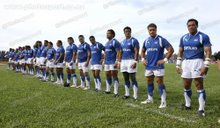

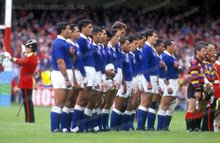

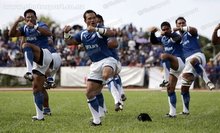

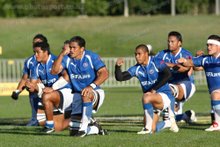
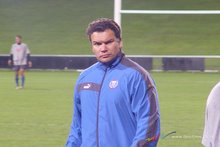


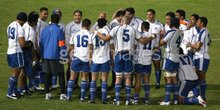
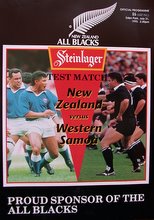
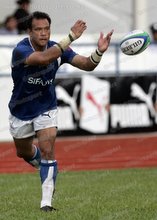
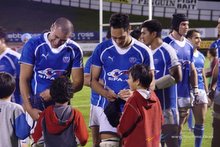

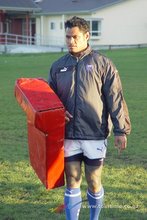
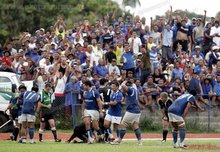
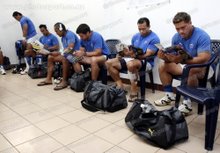
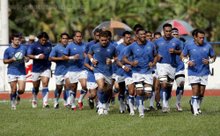
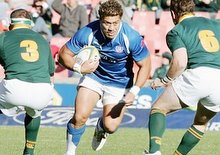

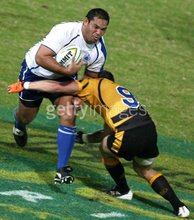
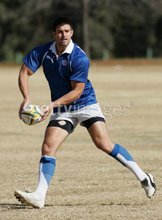
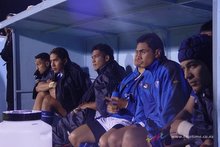
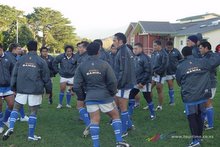
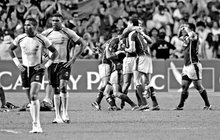

No comments:
Post a Comment